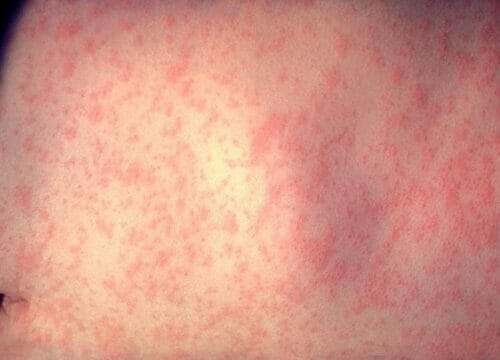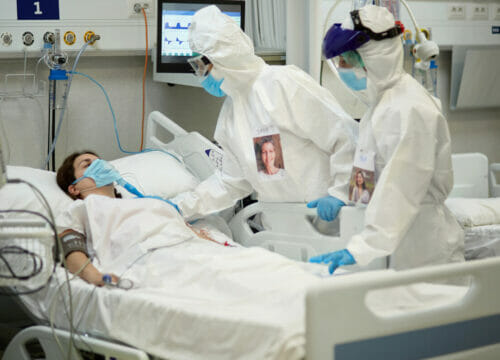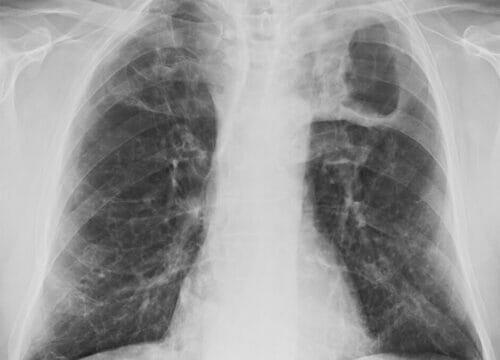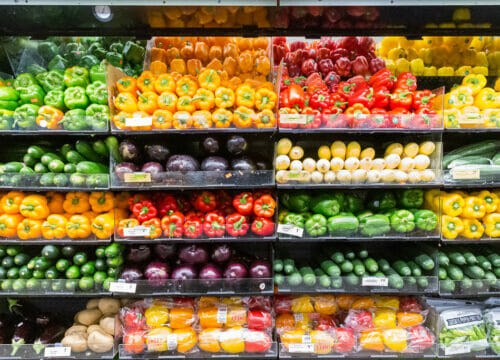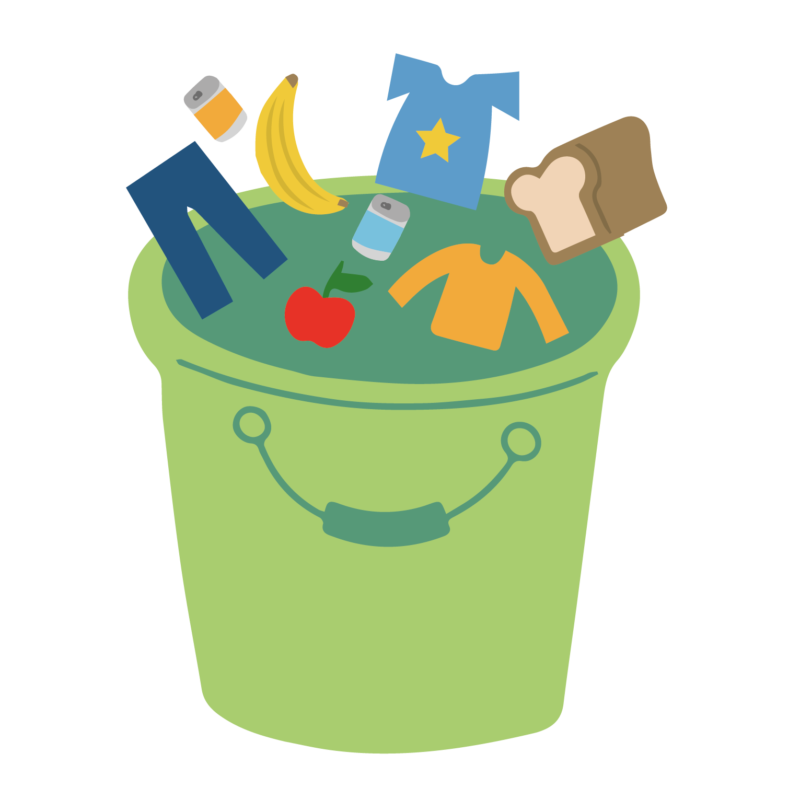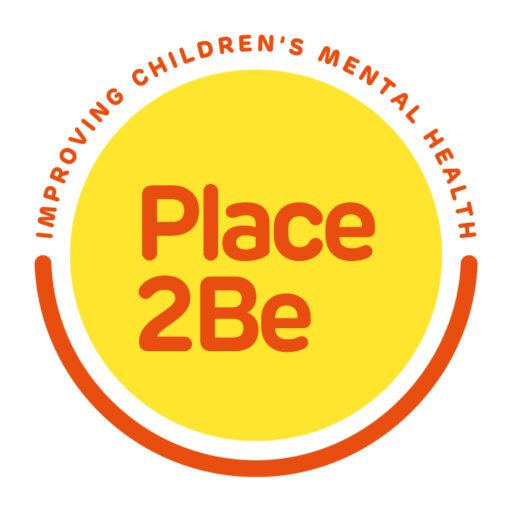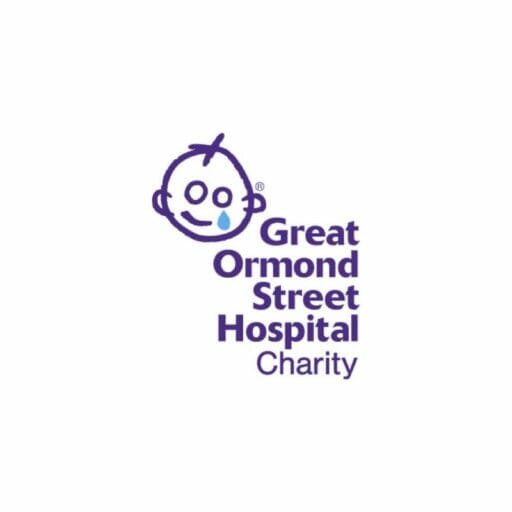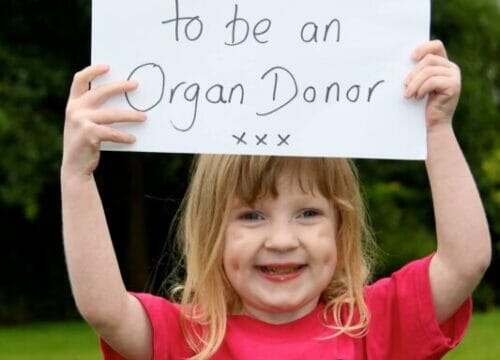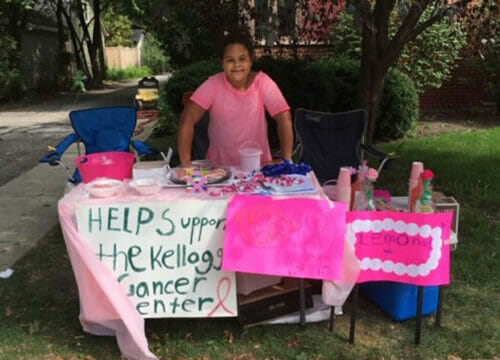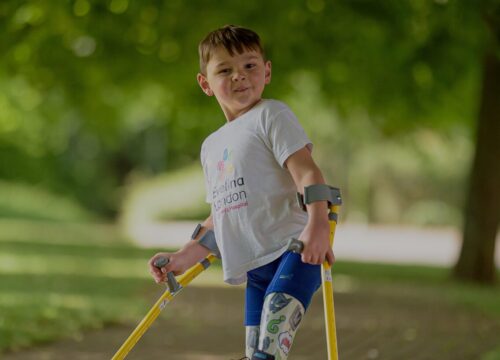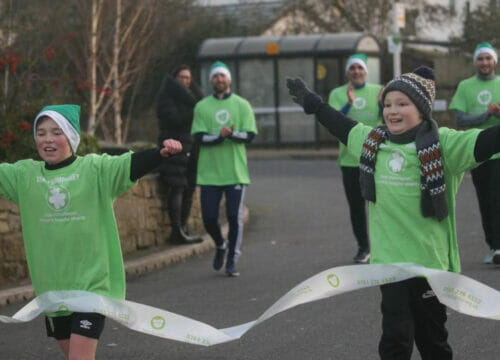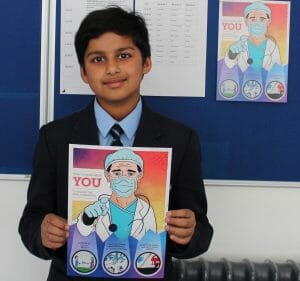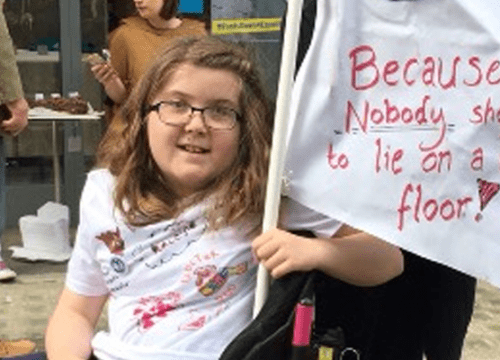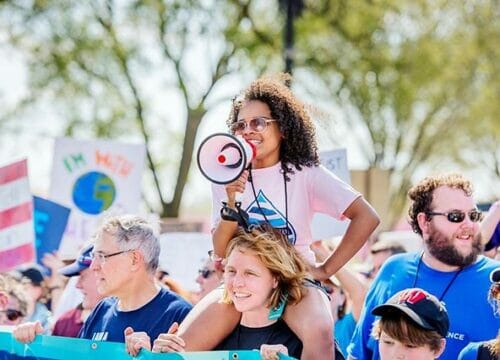At the Anti-Bullying Alliance (ABA) we work tirelessly to unite against bullying and create environments where children feel safe to be themselves without fear of bullying be it online or ...
Good Health and Well-Being
Good healthcare for all people

1. THE PROBLEM
Have you ever felt so poorly that you couldn’t concentrate or go to school?
Our bodies and minds need to be working well for us to do amazing things.
But all over the world people are in fact quite sick. Sadly people are much more likely to get very sick in some countries than in others. This can depend on whether the country has access to enough clean food and water, whether there are enough hospitals and whether people have enough money to pay to see a doctor.

2. The Solution
So what can we do to help?
We need to make good health accessible to everyone no matter where they come from or how much money they have.
This could include making sure that money isn’t a barrier to leading a healthy lifestyle and accessing a doctor or hosting awareness campaigns so that people know how to look after themselves to stay healthy and avoid having to see a doctor.

3. Take Action
There are lots of ways that anyone, including you, can make a difference in achieving good health for all. For example, you could: donate your hair to make wigs for children experiencing hair loss or make a poster to offer guidance on how people can wash their hands effectively.
Everyone can take action to make real change. What will you do?



4. CHARITIES
There are lots of charities that need your help to ensure good health for all.
For example, Barnardos keep children safe, The Against Malaria Foundation protect people from malaria and Brake look after people who have been affected by road accidents.
See how you can support them in their amazing work.
What would you say if someone sent you into a cricket match with a broken bat or asked you to play in a concert with a piano that isn’t in tune? You could probably make do if you had to but things might not go very well at all!
In the same way, every human being’s body needs to be working well for them to work, live and be happy. When you aren’t healthy and you try to get stuff done, it really does feel as frustrating as playing with a broken cricket bat or an out-of-tune piano. Humans need to be healthy, not sick! So what does good health mean?
The World Health Organization (WHO – watch a video on what the WHO does) has an important job to do: they have to try and get everyone in the world to be as healthy as possible. To do this job, they’ve come up with a definition for what it means to be healthy.
WHO says that health is: ‘A state of complete physical, mental and social well-being and not merely the absence of disease or infirmity’.
In other words, when you are healthy, your body, mind and social interactions are all doing well. The world would be a wonderful place if everyone was healthy. Unfortunately, many people out there are, in fact, quite sick.
The problem
40%
OF COUNTRIES HAVE FEWER THAN 10 DOCTORS PER 10,000 PEOPLE
1/6
of people are affected by mental health problems
> £600,000,000
is spent by the UK government each year to run the NHS
1. Different things that can make people sick
Diseases Spread by Germs
When germs make people sick, they are called infectious diseases. There are so many infectious diseases in the world but there are a few that cause the most trouble. These are tuberculosis (TB), malaria, measles, flu, Covid-19 and diarrhoeal diseases.
People are more likely to catch infectious diseases if they don’t have access to clean water to drink and wash with. Infectious diseases also spread more in areas where people live very close together.
Diseases That Are Not Spread by Germs
Sometimes people don’t have germs but their bodies don’t quite work like they’re supposed to. About 70% of all deaths in the world are caused by diseases that aren’t caused by germs, like heart disease, cancer, lung disease and diabetes.
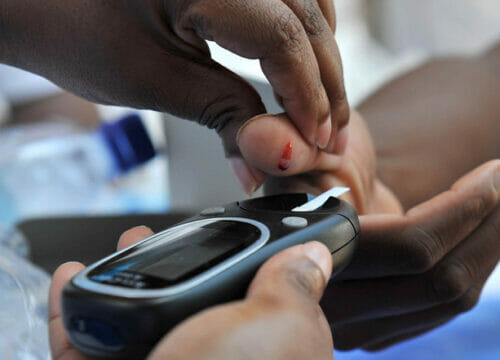

Many of these diseases are caused by people’s lifestyles. People who smoke, drink a lot of alcohol, eat a poor diet, don’t exercise and don’t sleep enough are more likely to be affected. However, there are a handful of diseases that have nothing to do with people’s lifestyles. Some people might even be born with a disease or disability.
Mental Health
Some people don’t have diseases or injuries but the way they think, their feelings and their general mood is just not the way they should be. When this happens, these people are struggling with their mental health. There are lots of different mental health problems that both children and adults go through. These problems can make people feel unhappy, lonely, anxious, or angry. Mental health problems affect around one in six people. That means that on a full red London bus, there may be at least 10 people struggling with mental health. Watch the first video below to learn more.
There are lots of different things that can affect someone’s mental health. For example, some children experience a lot of sadness and fear because of bullying. Feeling like this all the time isn’t good for their mental health. They could start suffering from depression and anxiety. Watch the second video above to learn more.
Injuries
People get injured while doing many different kinds of things. Sometimes injuries are temporary – like falling off your bike and scraping your knee. Other times, injuries are permanent – like being paralysed in a car accident.
Some things make accidents more likely to happen and more serious. Looking at car accidents, for example, these include driving too fast, driving after having drunk too much alcohol or texting and driving. Cyclists may also increase their chances of being involved in an accident if they don’t wear bike lights or don’t signal when they are turning a corner.
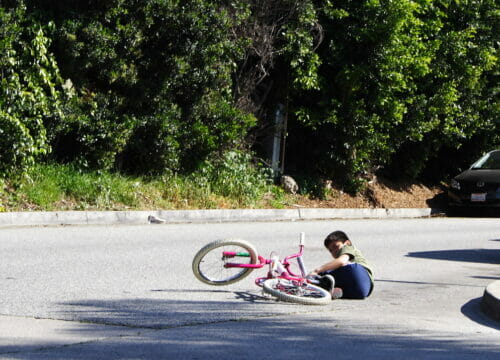

2. Big Problems in the Way of Good Health for All
There are four big reasons stopping us from achieving Good Health and Well-Being for everyone. As you read the reasons below, think about how they might affect different people. You may start to notice that people from poorer countries or households are more likely to suffer from bad health than those from wealthier ones. This is called health inequality.
Lack of Knowledge
People do not know enough about how to look after themselves to stay in good health.
For example, people need to take care of themselves and:

practise good hygiene
- eat well
- exercise
- sleep enough
- talk about emotions
- wear a seatbelt in the car
- wear a helmet on a bike
- wear sun cream when out in the sun.
The list goes on – there are so many things people can do to keep themselves healthy but often they just don’t know any better.
Lack of Resources
People cannot afford healthy lifestyles and find themselves in bad health due to poverty-related reasons such as not being able to access food, water, or even a doctor! Or, living in an area where air pollution is dangerously high.
People living in poverty cannot always afford healthy food. Unfortunately, it is sometimes more expensive to eat healthy and nutritious food than to eat unhealthy and processed food. For example, a packet of instant noodles costs about £0.60, whereas a portion of homemade lasagne with some vegetables costs about £2.00 per serving. Not only does making fresh meals cost more but it often takes more time, so people who work long hours struggle to find the time to cook. You can learn more about hunger here.
People living in poverty, especially those in developing countries, often don’t have clean water. They have no choice: they have to drink and wash with dirty water. Dirty water carries bacteria that cause diarrhoeal diseases, making people sick. You learn more about water here.
Many people, particularly in developing countries, do not live near doctors and hospitals. Scroll down to see a map of how many doctors each country has per 1,000 people. You will notice a really big spread. Cuba leads the way with more than 8 doctors per 1,000 people, compared to other countries, particularly African countries, which have less than 1 doctor per 1,000 people.
On top of this, some cures and treatments are very expensive. Whether people can pay for these treatments will depend on whether their country has a universal healthcare system or whether they have enough money for private medical insurance to pay for it themselves.
People living in poverty often live in places that have lots of air pollution. This is because the areas that are the most polluted tend to be the least expensive to live in. Often, factories that cause heavy pollution are placed in poor countries. Their products are exported for rich countries to enjoy, without them needing to deal with the pollution.

Lack of Cures
Not all health problems have cures. Scientists and researchers are still working hard, searching for treatments for many of the world’s worst diseases.
Medical research takes a lot of time and costs a lot of money because expensive equipment, chemicals and the scientists’ salaries need to be paid. Developing a new medicine costs about £1 billion.
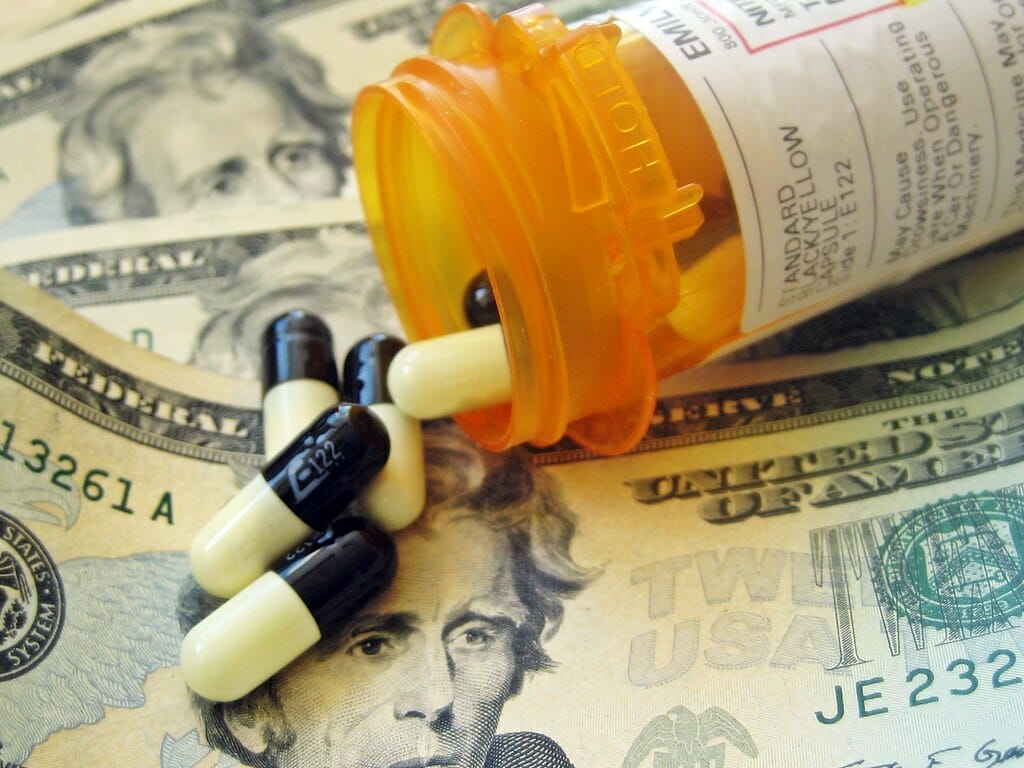
Healthcare Around the World
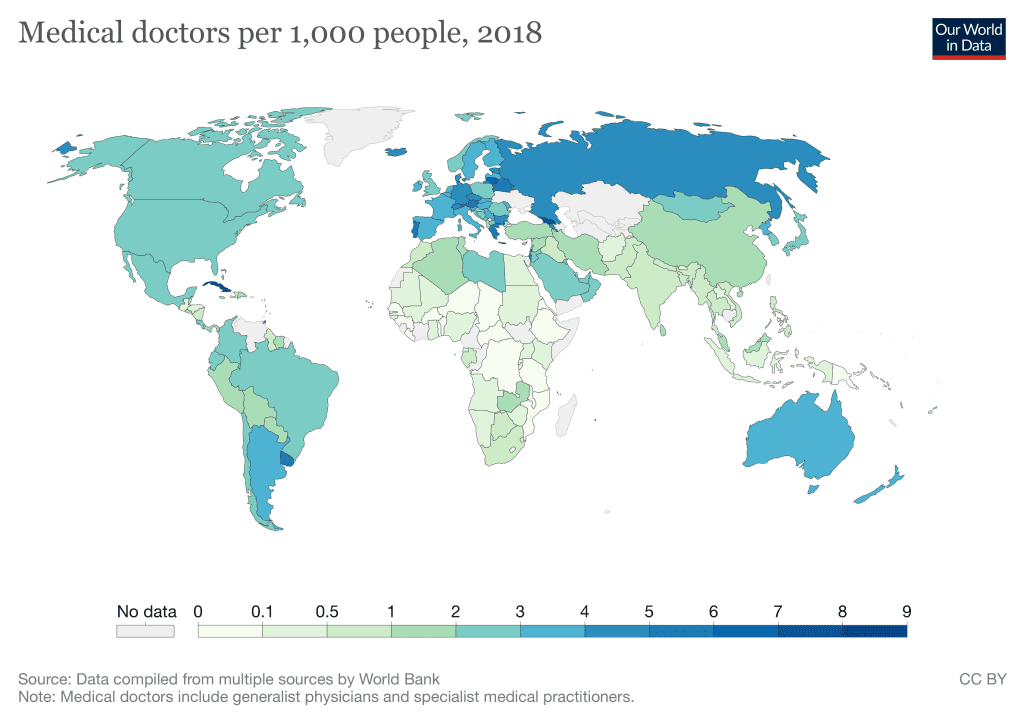
Interpreting the Map
This map shows the number of doctors per 1,000 people in each country. The key at the bottom can help you interpret the map. The countries in pale yellow and green have less than 1 doctor for 1,000 people. The countries in dark blue have more than 8 doctors per 1,000 people.
Take a Guess
The Solution
Scientists, doctors and nurses have already made great leaps in discovering ways to prevent and treat all kinds of illnesses and they continue to make good progress. To ensure that these treatments are available to everyone, the four big problems from earlier need to be addressed.
1. People need to be taught how to look after themselves to stay in good health
There are lots of different ways that people can be informed about how to look after themselves. For example, schools could include lessons on this in PSHE (Public, Social, Health and Economic) education. Or, posters could be displayed in schools, shops, buses, trains, doctors’ waiting rooms and anywhere else where people might read them. Here are some examples of ways that people can be taught to look after themselves better:
Most people in the world know that smoking, alcohol, bad food and inactivity can contribute to making them sick. But few people recognise how important sleep is and how it can affect physical and mental health. Adults who get less than 6 hours of sleep a night are 4 times more likely to suffer from lack of concentration and 48% more likely to die of heart disease. There are lots of reasons why people might not get enough sleep. Some of these reasons can be fixed with a simple behaviour change but few people know about them. This is where educational campaigns can help. Educational campaigns could share ideas such as: getting up and going to sleep at the same time each day, turning off electronics an hour before bed and avoiding big meals and caffeine right before bed.
These offer advice to pedestrians and cyclists to keep them safe on the roads. Pedestrians could be taught to use the motto ‘Stop’, ‘Look’, ‘Listen’, ‘Think’ and reminded that they must not be on their phone whilst walking. Cyclists could be reminded to wear a helmet and use lights (white at the front and red at the back). They should also follow the road signs and stop at traffic lights and pedestrian crossings. It is also important that they signal clearly when turning and make eye contact with other road users.

2. Healthy lifestyles need to be made affordable
There are lots of different ways to support people to lead healthy lifestyles, no matter how rich or poor they are.
Governments can subsidise fruit and vegetables so that it is less expensive to eat healthily, making it possible for everyone to eat healthily.
Governments can set laws to make it illegal to conduct polluting activities. This can then lead to improvements in the air quality over time, which can help make people healthier.
3. Medical care needs to be made accessible, both in terms of location and cost
Medical care needs to be made accessible to everyone no matter where they live, or how much money they have.
To make sure that everyone lives close to a hospital, more hospitals need to be built and more doctors need to be trained. These can be built using tax-payer money, foreign aid, or money raised by charities.
As to cost, some charities offer medical aid to those who don’t have any to help ensure that everyone benefits from healthcare when they need it. Another way to make sure that everyone can get healthcare is to vote for a government that wants a universal healthcare system. The UK has a National Health System (NHS). The NHS uses tax-payer money to fund a healthcare system that is completely free to all members of the public.

4. Research needs to be carried out to find new cures and treatments
Many charities raise money to fund medical research, which can bring humanity one step closer to finding cures to horrible diseases – for example, for cancer research, which costs a lot of money. In 2020, the UK charity ‘Cancer Research’ spent £388 million!
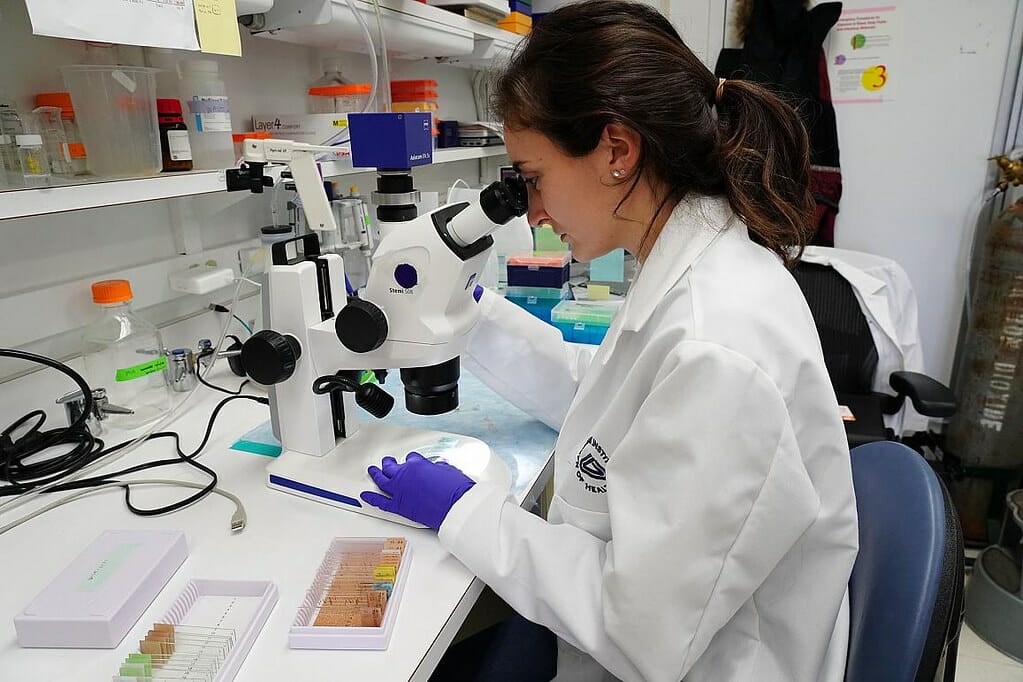
Take action
Now that you understand a bit more about Good Health and Well-Being, it’s time to make a difference. If you want to do something practical to help, the power is in your hands. Take a look at some ways you can take action right now.
Fundraise
- You can make a massive difference in somebody’s life by doing fundraising for charities that work to improve health for all. Some of the things the money you raise can achieve:
- £1.50 provides a malaria net to a family in need
- £20 covers the cost of a drop-in session with a counsellor
- £30 pays for a world-leading scientist to do an hour of research
- £550 buys a next-generation DNA sequencing experiment, helping reveal secrets about cancer
- £400 covers the cost of running a live support chat system for one day

- Most importantly, before you can help anyone else, look after your own mental and physical health. To do this, you should sleep enough, eat nutritious meals, drink lots of water, exercise, wash your hands often and talk about any problems that are on your mind. Watch this video for a few easy things you can do to stay in good physical health. Watch this video to hear from other children about mental health.
- Do a speech or assembly at your school to raise awareness about how to maintain good mental and physical well-being. Watch this video for some ideas of how to stay physically healthy. Watch this video for ideas from other children about how they look after their mental health.
- Make a poster for your school about hygiene. You might like to also offer some guidance on how people can wash their hands effectively. Click here to see a video on the different steps of handwashing.
- Make a poster for your school to raise awareness about road traffic accidents and what people can do to prevent them. You might also like to include some of facts about road traffic accidents to grab attention.
- Tell your friends and family that they can always come and talk to you if they have any troubles. Share your feelings and emotions with them too! Remember – a problem shared is a problem halved!
- Start a cooking club at your school. Use this club to share knowledge about healthy diets and try out some delicious and nutritious recipes!
- Start a yoga club at your school. Not only does yoga improve balance, strength and endurance, yoga is also a wonderful way to practice mindfulness and help us recognise how we are feeling.
- Donate your hair to make wigs for children experiencing hair loss because of cancer treatment or other conditions. If you are under 16, you must obtain permission from your parent or guardian before having your hair cut.
- Donate toys to children in hospital. For example, you could donate to Great Ormond Street Hospital. Click here to read Great Ormond Street Hospital’s page and see what you can donate and how.

If you have any other ideas of SuperKind things people can do to help achieve good health and well-being, we would love to hear from you here.
Support These Amazing Charities
Roald Dahls Marvellous Childrens Charity
Roald Dahl’s Marvellous Children’s Charity provides specialist nurses and support for seriously ill children. There are currently over 120 Roald Dahl Nurses caring for over 33,000 seriously ill children across ...
Comic Relief
Comic Relief is a charity that helps people in need by raising money for families and children in the UK and worldwide.
Médecins Sans Frontières / Doctors Without Borders (MSF)
We are Médecins Sans Frontières / Doctors Without Borders (MSF).
Our teams act fast to provide medical care and save people’s lives in conflict zones, natural disasters and epidemics.
Place2Be
Place2Be is the UK’s leading children’s mental health charity providing support to children in schools across England, Scotland and Wales.
Our vision is for a world where no child has ...
WHO Foundation
The World Health Foundation supports the work of the WHO (the United Nations agency working to promote good health and well-being to everyone around the world).
Great Ormond Street Hospital
Great Ormond Street Hospital helps look after seriously sick children, and the team at GOSH make children’s stay in hospital as fun as it can be.
Barnardos
Barnardo?s helped improve the lives of more than 240,000 vulnerable children, young people and their families. we help children including those who have been sexually exploited, young people leaving care, ...
Children’s Book Project
The Children’s Book Project is a charity that aims to make sure every child has their very own books to read and enjoy. 📚✨
Shelter
Home is a human right. We exist to defend the right to a safe home and fight the devastating impact the housing emergency has on people and our society.
Change-Makers
Here are some amazing young people who cared about improving health for all and took action to make change happen. These change makers were all passionate about the same cause but used their unique skills to make change happen in different ways.
Everyone can help make a difference. Consider what your unique superpower might be. Are you someone with a strong voice who likes to spread awareness by talking to everyone you meet? Or do you prefer a behind the scenes approach – making sure that donations are collected to take to those in need?
Olivia Ohlson
Set up organisations supporting cancer patients, people in poverty, and promoting golf in young black girls, since she was 10 years old.
